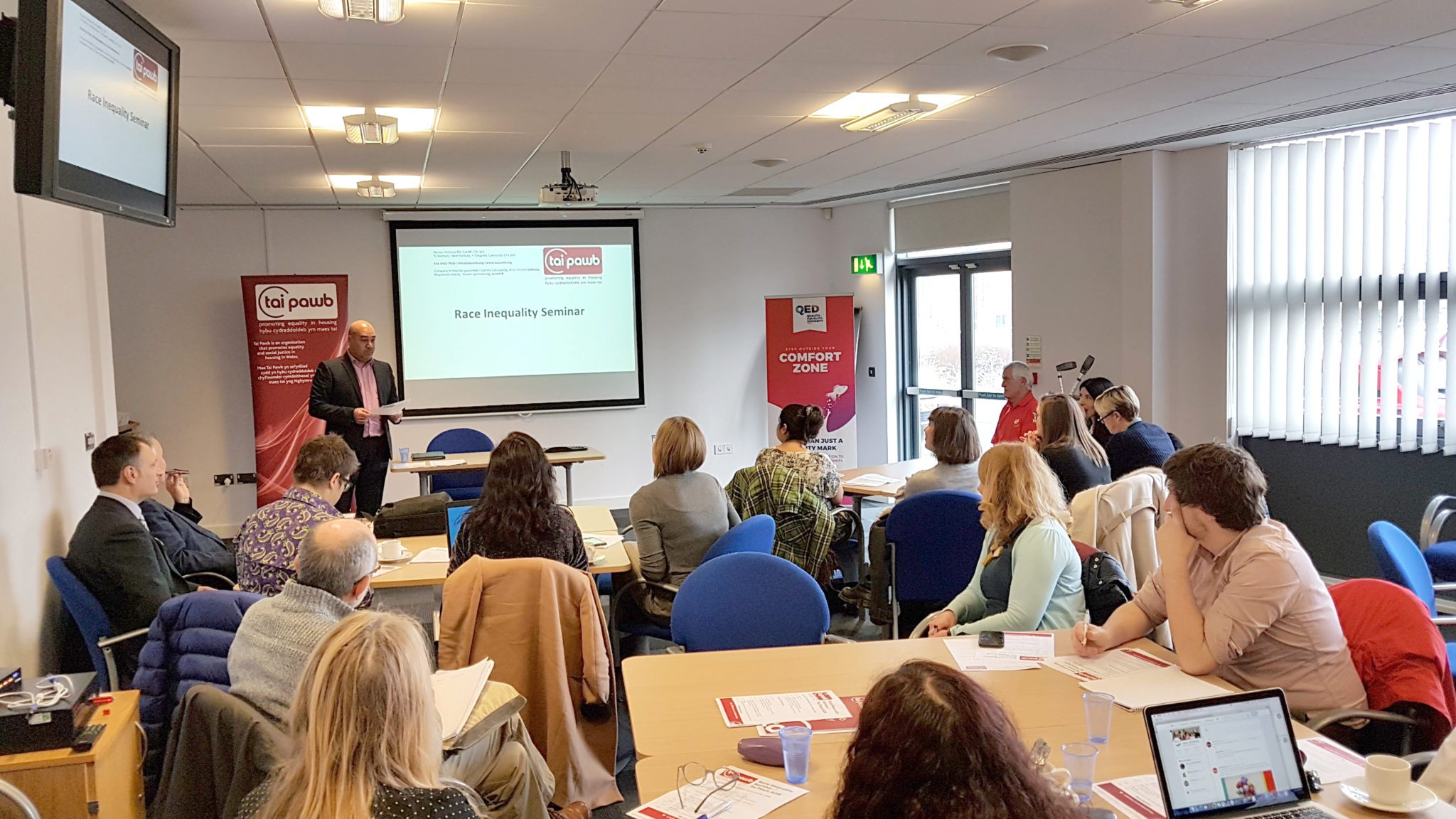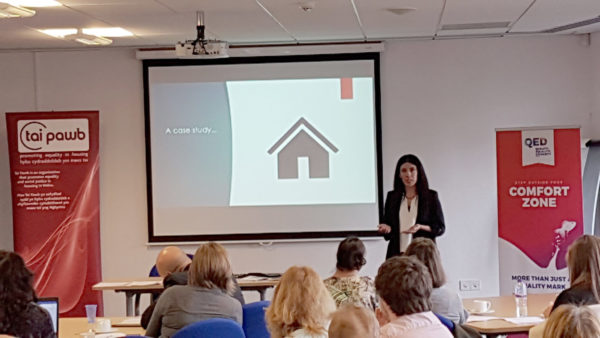ICYMI: Race Inequality Seminar

We gathered an experienced and diverse group of speakers for our first event of 2018 to talk about race inequality in housing.
This event should have been the final one of 2017, but the weather had other ideas. Luckily for us, the Orbit Business Centre in Merthyr Tydfil kindly allowed us to rearrange and we re-filled the attendee list with plenty of interested and enthusiastic people from the housing, public and third sectors.
Our first speaker was Tom Murtha, Chair of North Wales Housing, who gave a powerful and personal history of his experiences of working on anti racism.
“I think back to the first people I let to, a black couple, and I wonder if i’d be able to house them as easily now”
Despite 40 years of trying to resolve race issues, Tom was frustrated that these types of seminars still need to take place. Much of the work in the 80s and 90s promised a lot, but failed to deliver the necessary changes. He cited initiatives from Inside Housing and 24Housing that, whilst being very welcome, are nothing particularly new compared to the initiatives of 30 years ago.
There was also discussion of unconscious bias and how, when employing people, you tend to recruit in your own image, and while of course it is vital to accept the best candidate it is important to review how you define ‘best’. Tom advocated the return of some kind of regulation to hold housing providers to account. He doesn’t think the regulator and audit commission ending their involvement and housing providers taking their eye off the ball is a coincidence.
“Race work has given me the most joy, but the most despair”
In an admittedly frustrated and sometimes even gloomy speech, Tom ended by wishing that the next generation truly faces these issues and doesn’t let it slip down the agenda.
This was the perfect opening for the event, setting out the context and history of what we were all working on. Hearing the issues and problems of the past helped energise the audience to work even harder.

Next up was another speaker who started with a personal story.
Rocio Cifuentes, Director of EYST, told us how her parents arrived in Swansea as refugees from Chile and the effect that a simple housing choice had on her life.
In her research for this event, Rocio was able to reflect on the importance of housing, and its fundamental impact on life chances. She believes her parents choice to aspire to live in a certain area in Swansea meant she avoided discrimination when she was young. She also felt these housing choices influenced her entry to Cambridge University and eventual achievement of a successful career.
We also heard Rocio’s views on the roots of racism, and her understanding of differing levels. An interesting thought was: what are the housing conditions and opportunities for those that are sympathetic to far-right politics? In condemning them outright, are we ignoring their genuine concerns and allowing them to be claimed by the far-right? By labelling them all racist, we judge them too quickly, and fail to address the root of the problem.
“We’re living in a real life monopoly board, apart from in Monopoly everyone starts with the same amount”
The economic disparity seen in the UK is shared amongst all working class people, almost regardless of their ethnic background, and differences in class are often more pronounced than differences in race. However, this is not the common perception, and it is this that can lead to racism through genuine grievances that are misdirected.
Rocio concluded that the struggle for gender equality started with women being expected to act like men to get ahead, and that we must be careful not to let racial equality go the same way.
Sanjiv Vedi is a board member of Hendre, chair of its Governance Committee and is attempting to do things differently. He began by giving some statistics and posited that the growing older population and income disparity were key factors in someone’s life chances. These stats were deliberately not all directly related to race and gender, as he wanted to look at the whole situation in context.
Sanjiv also suggested housing associations generally didn’t have the mindset to tackle huge income disparity issues in their communities, as this is not instinctively in their remit, but at Hendre he is working closely with the Chief Executive to try and make a difference.
When addressing racism directly, he picked up on an earlier comment from Tom Murtha and told the audience not to be embarrassed to be white and talk about racism. The more people are talking about it and having honest conversations the better. However, we pointed out that we have to be better at listening to and addressing people’s concerns rather than just wagging our finger and telling them what not to do.
“We tell people what to do, but we don’t listen that well.”
He also mentioned the challenge that proposals for paid board members represents, as when positions like this become ‘professionalised’ they tend to be filled with the same old people who won’t be doing the work for the same altruistic reasons. Sanjiv said shadowing opportunities for BME people is an ideal way to for them to gain experience and he was sure that he could fill any positions offered.
Sian Sanders gave a presentation on her work as Community Cohesion Regional Co-ordinator for Cardiff & the Vale of Glamorgan. She explained the two areas are very different but there are still unexpected pockets of diversity across both authorities. She echoed how class was a major factor in community cohesion.
Between 2001 and 2011, every local authority in Wales had a foreign born population increase of at least 50%, with Merthyr Tydfil experiencing the greatest increase of 227%.
Sian made the interesting observation that diversity itself is becoming more diverse, a concept known as ‘super-diversity’. It is important to remember the wide variations within BME communities and even within ethnic groups. This is becoming more prominent as more distinct ethnic groups are able to express themselves rather than identifying, or at least being associated with, regional groups.
There was also some interesting points made about many ‘super-diverse’ cities who are using their local powers to do things differently from national policy. This means issues such as inclusion and cohesion can be tailored to an areas situation rather than applying a blanket national policy.
If there are equality and diversity issues in housing that you want to learn more about, or have a project you’d love to share, please get in touch!
You can also keep up to date with our upcoming events here.